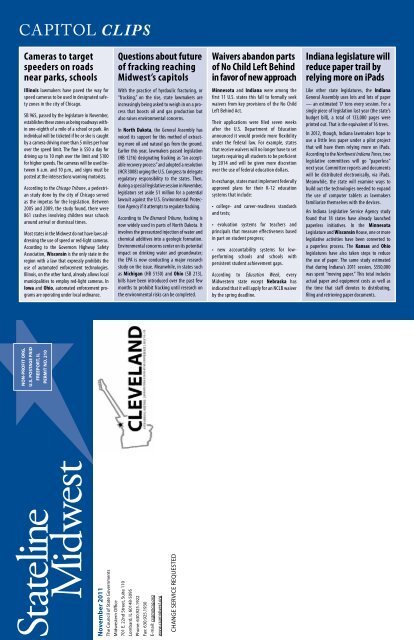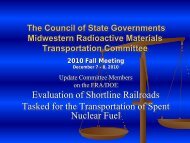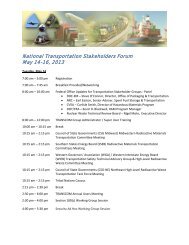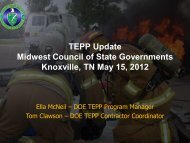Stateline Midwest - CSG Midwest
Stateline Midwest - CSG Midwest
Stateline Midwest - CSG Midwest
Create successful ePaper yourself
Turn your PDF publications into a flip-book with our unique Google optimized e-Paper software.
CAPITOL CLIPS<br />
Cameras to target<br />
speeders on roads<br />
near parks, schools<br />
Questions about future<br />
of fracking reaching<br />
<strong>Midwest</strong>’s capitols<br />
Waivers abandon parts<br />
of No Child Left Behind<br />
in favor of new approach<br />
Indiana legislature will<br />
reduce paper trail by<br />
relying more on iPads<br />
Illinois lawmakers have paved the way for<br />
speed cameras to be used in designated safety<br />
zones in the city of Chicago.<br />
SB 965, passed by the legislature in November,<br />
establishes these zones as being roadways within<br />
one-eighth of a mile of a school or park. An<br />
individual will be ticketed if he or she is caught<br />
by a camera driving more than 5 miles per hour<br />
over the speed limit. The fine is $50 a day for<br />
driving up to 10 mph over the limit and $100<br />
for higher speeds. The cameras will be used between<br />
6 a.m. and 10 p.m., and signs must be<br />
posted at the intersections warning motorists.<br />
According to the Chicago Tribune, a pedestrian<br />
study done by the city of Chicago served<br />
as the impetus for the legislation. Between<br />
2005 and 2009, the study found, there were<br />
861 crashes involving children near schools<br />
around arrival or dismissal times.<br />
Most states in the <strong>Midwest</strong> do not have laws addressing<br />
the use of speed or red-light cameras.<br />
According to the Governors Highway Safety<br />
Association, Wisconsin is the only state in the<br />
region with a law that expressly prohibits the<br />
use of automated enforcement technologies.<br />
Illinois, on the other hand, already allows local<br />
municipalities to employ red-light cameras. In<br />
Iowa and Ohio, automated enforcement programs<br />
are operating under local ordinance.<br />
With the practice of hyrdaulic fracturing, or<br />
“fracking,” on the rise, state lawmakers are<br />
increasingly being asked to weigh in on a process<br />
that boosts oil and gas production but<br />
also raises environmental concerns.<br />
In North Dakota, the General Assembly has<br />
voiced its support for this method of extracting<br />
more oil and natural gas from the ground.<br />
Earlier this year, lawmakers passed legislation<br />
(HB 1216) designating fracking as “an acceptable<br />
recovery process” and adopted a resolution<br />
(HCR 3008) urging the U.S. Congress to delegate<br />
regulatory responsibility to the states. Then,<br />
during a special legislative session in November,<br />
legislators set aside $1 million for a potential<br />
lawsuit against the U.S. Environmental Protection<br />
Agency if it attempts to regulate fracking.<br />
According to The Bismarck Tribune, fracking is<br />
now widely used in parts of North Dakota. It<br />
involves the pressurized injection of water and<br />
chemical additives into a geologic formation.<br />
Environmental concerns center on its potential<br />
impact on drinking water and groundwater;<br />
the EPA is now conducting a major research<br />
study on the issue. Meanwhile, in states such<br />
as Michigan (HB 5150) and Ohio (SB 213),<br />
bills have been introduced over the past few<br />
months to prohibit fracking until research on<br />
the environmental risks can be completed.<br />
Minnesota and Indiana were among the<br />
first 11 U.S. states this fall to formally seek<br />
waivers from key provisions of the No Child<br />
Left Behind Act.<br />
Their applications were filed seven weeks<br />
after the U.S. Department of Education<br />
announced it would provide more flexibility<br />
under the federal law. For example, states<br />
that receive waivers will no longer have to set<br />
targets requiring all students to be proficient<br />
by 2014 and will be given more discretion<br />
over the use of federal education dollars.<br />
In exchange, states must implement federally<br />
approved plans for their K-12 education<br />
systems that include:<br />
• college- and career-readiness standards<br />
and tests;<br />
• evaluation systems for teachers and<br />
principals that measure effectiveness based<br />
in part on student progress;<br />
• new accountability systems for lowperforming<br />
schools and schools with<br />
persistent student achievement gaps.<br />
According to Education Week, every<br />
<strong>Midwest</strong>ern state except Nebraska has<br />
indicated that it will apply for an NCLB waiver<br />
by the spring deadline.<br />
Like other state legislatures, the Indiana<br />
General Assembly uses lots and lots of paper<br />
— an estimated 17 tons every session. For a<br />
single piece of legislation last year (the state’s<br />
budget bill), a total of 133,080 pages were<br />
printed out. That is the equivalent of 16 trees.<br />
In 2012, though, Indiana lawmakers hope to<br />
use a little less paper under a pilot project<br />
that will have them relying more on iPads.<br />
According to the Northwest Indiana Times, two<br />
legislative committees will go “paperless“<br />
next year. Committee reports and documents<br />
will be distributed electronically, via iPads.<br />
Meanwhile, the state will examine ways to<br />
build out the technologies needed to expand<br />
the use of computer tablets as lawmakers<br />
familiarize themselves with the devices.<br />
An Indiana Legislative Service Agency study<br />
found that 18 states have already launched<br />
paperless initiatives. In the Minnesota<br />
Legislature and Wisconsin House, one or more<br />
legislative activities have been converted to<br />
a paperless process. The Kansas and Ohio<br />
legislatures have also taken steps to reduce<br />
the use of paper. The same study estimated<br />
that during Indiana’s 2011 session, $550,000<br />
was spent “moving paper.” This total includes<br />
actual paper and equipment costs as well as<br />
the time that staff devotes to distributing,<br />
filing and retrieving paper documents.<br />
<strong>Stateline</strong><br />
<strong>Midwest</strong><br />
November 2011<br />
The Council of State Governments<br />
<strong>Midwest</strong>ern Office<br />
701 E. 22nd Street, Suite 110<br />
Lombard, IL 60148-5095<br />
Phone: 630.925.1922<br />
Fax: 630.925.1930<br />
E-mail: csgm@csg.org<br />
www.csgmidwest.org<br />
CHANGE SERVICE REQUESTED<br />
NON-PROFIT ORG.<br />
U.S. POSTAGE PAID<br />
FREEPORT, IL<br />
PERMIT NO. 210








